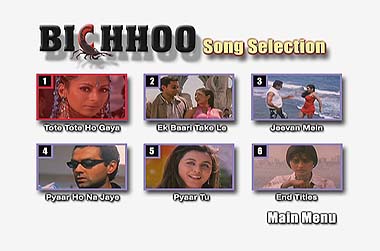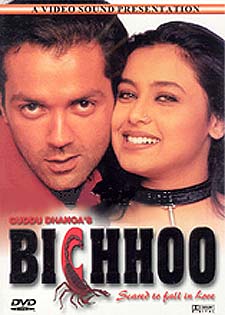 |
BICHHOO (2000) ("Scorpion")
Produced and Directed by: Guddu Dhanoa Starring: Bobby Deol, Rani Mukherji [Mukherjee], Ashish Vidyarthi, Malaika [Arora] Khan, Farida Jalal, Mohan Joshi, Suresh Chatwal, Ishrat Ali, Pramod Moutho, Mahavir Shah, Avtar Gill Action: Tinu Verma
Music: Anand Raj Anand Running Time: 162 Minutes
CineRating: 3 out of 10
|

It seems like ages ago that French director Luc Besson actually seemed capable of proving to the world that even Gallic filmmakers could be as entertainingly loud, violent and kinetic as their American and Hong Kong counterparts. But after the big budget follies of The Fifth Element and the turgid The Messenger, Besson seems to have all but faded into the woodwork, content merely to produce a series of ineptly scripted and instantly disposable action flicks like Taxi [1998] and Kiss of the Dragon [2001]. His legacy lives on, though, for better or for worse in the form of his two most slavishly imitated features, La Femme Nikita [1990] and Leon: The Professional [1994].
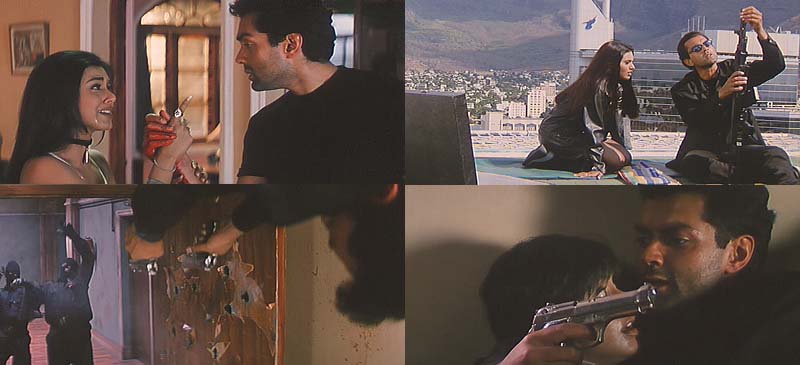
Punching in as India's backhanded tribute to the latter film, Bichhoo is even more shameless in its thievery from The Professional than Hong Kong's Black Cat was from La Femme Nikita, but, in the case of the Hindi film, the results are decidedly more disjointed. The most bizarre aspect of Bichhoo is the fact that, although lead stars Bobby Deol and Rani Mukherjee are far closer in age range than original stars Jean Reno and Natalie Portman, the story doesn't seem to have been reconfigured to reflect that. I'm sure the filmmakers realized that one of the chief virtues of Besson's film lay in its offbeat interaction between the oddly paired duo of Portman and Reno, but they've ended up shoehorning Deol and Mukherjee into similar roles while disregarding the fact that neither makes anything close to a comfortable fit. As a result, the sleepy-eyed Deol shambles through the film evincing the dazed stupor of someone who seems to have reached middle age twenty years too soon, while Rani pouts, screams, and bounces around in a hyperactive mode that makes her appear even less mature than the character that the pre-teen Natalie Portman originated.
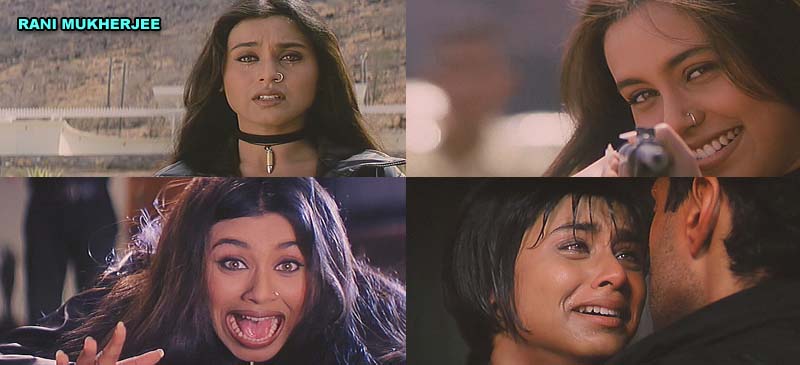
The storyline essentially follows the same route as Besson's movie, save for an awkwardly inserted, early flashback scene that explains how Jeeva (the hitman portrayed by Deol) was once an ordinary young man in love with a girl named Kiran (Malaika Arora Khan). Kiran's rich and powerful father disapproved of the relationship and ruined Jeeva's family, causing them to set themselves afire in shame. After Kiran also committed suicide out of guilt for her father's misdeed, Jeeva avenged his family's death by murdering the cruel-hearted patriarch -- thus beginning his life as a professional killer.
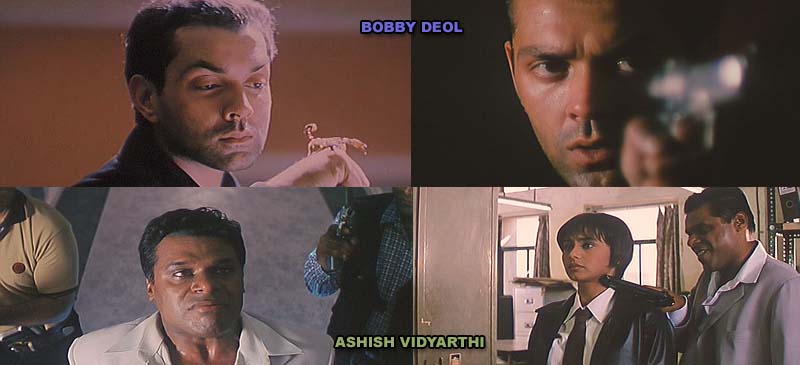
Jeeva resides with his pet scorpion (instead of the houseplant that Leon/Jean Reno considered his best friend) in an apartment complex next door to an obnoxious family whose rebellious daughter (Rani Mukherjee) frequently removes herself from the presence of in order to grab a clandestine smoke. The daughter is delivering milk to Jeeva when a corrupt narcotics agent named Devraj (Ashish Vidyarthi) shows up with his posse in order to eliminate the girl's doublecrossing father and his attendant family members. The daughter witnesses the slaughter from behind Jeeva's front door, but then misguidedly phones police to inform them that she can identify the killers. Realizing that the authorities are behind the murders, Jeeva quickly takes off -- with the now-orphaned daughter trying to keep up. At first, Jeeva wants nothing to do with this annoyingly perky ingenue, but a bond eventually develops between the mismatched pair due in no small part to the fact that the girl's name, like that of Jeeva's beloved deceased, is also "Kiran" (which prompts some of the most inane voiceover flashbacks in cinema history).

Devoid of the quirky subtext of Besson's original, Bichhoo struggles to merely be a routine action movie. Director Guddu Dhanoa (23rd March 1931 Shaheed [2002]) does manage to come up with an explosive finale that almost approximates the firepower of Besson's original, but the new twists to the storyline are just plain silly and the ridiculous interplay between the stone-faced Deol and the exuberant Mukherjee lends the movie an unintentional camp quality that was merely hinted at in the original via Besson's tacky dialogue. It's understandable that Dhanoa would have trouble working the upbeat song-and-dance numbers into a grim storyline that barely calls for them, but his solution ends up being exceedingly awkward at best. After the second and best number, "Ek Baari Take Le," the story proceeds on for over an hour without a single musical number -- and then suddenly delivers three in a span of less than thirty minutes.
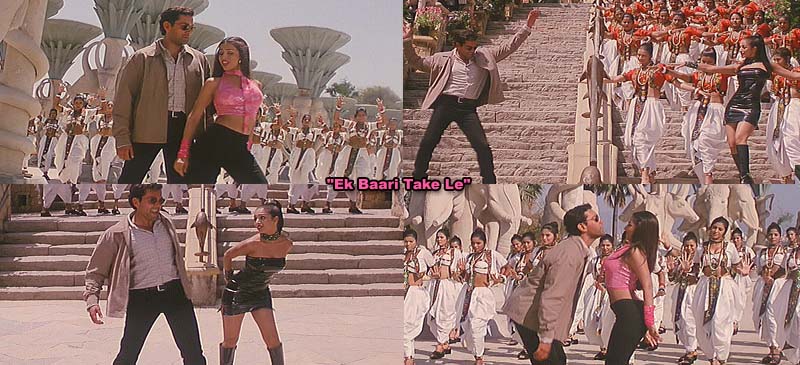
Deol gives his brooding loner all the personality of a coma patient, while Mukherjee proves that even a vastly appealing actress can grate on the nerves when a director allows her to emote at will. On the other hand, Ashish Vidyarthi (Kaho Naa... Pyaar Hai [2000]) is suitably menacing as the psychotic narcotics agent, although his character is basically just a facsimile of Gary Oldman's over-the-top nemesis from the original film (Vidyarthi's character even pops pills and shakes uncontrollably). While former model and MTV VJ Malaika Arora Khan gets to strut her considerable stuff in "Ek Baari Take Le" and has a tiny role as the first Kiran, she'll have to do considerably more than what she displays here in order to eclipse her memorable dance with Shahrukh Khan atop a train in the "Chaiya Chaiya" song from Dil Se.

The Video Sound DVD features a cropped 1.85:1 presentation with a typically overbright picture, but does sport acceptable sharpness and color. English subtitles are provided for the first couple of lines in each song, but nothing more.
|
|
|
DVD Specs:
Video Sound DVD
All Regions
Removable English Subs (partial/none for songs)
Trailers for Tera Jadoo Chal Gayaa; Chhupa Rustam

|
|
|

